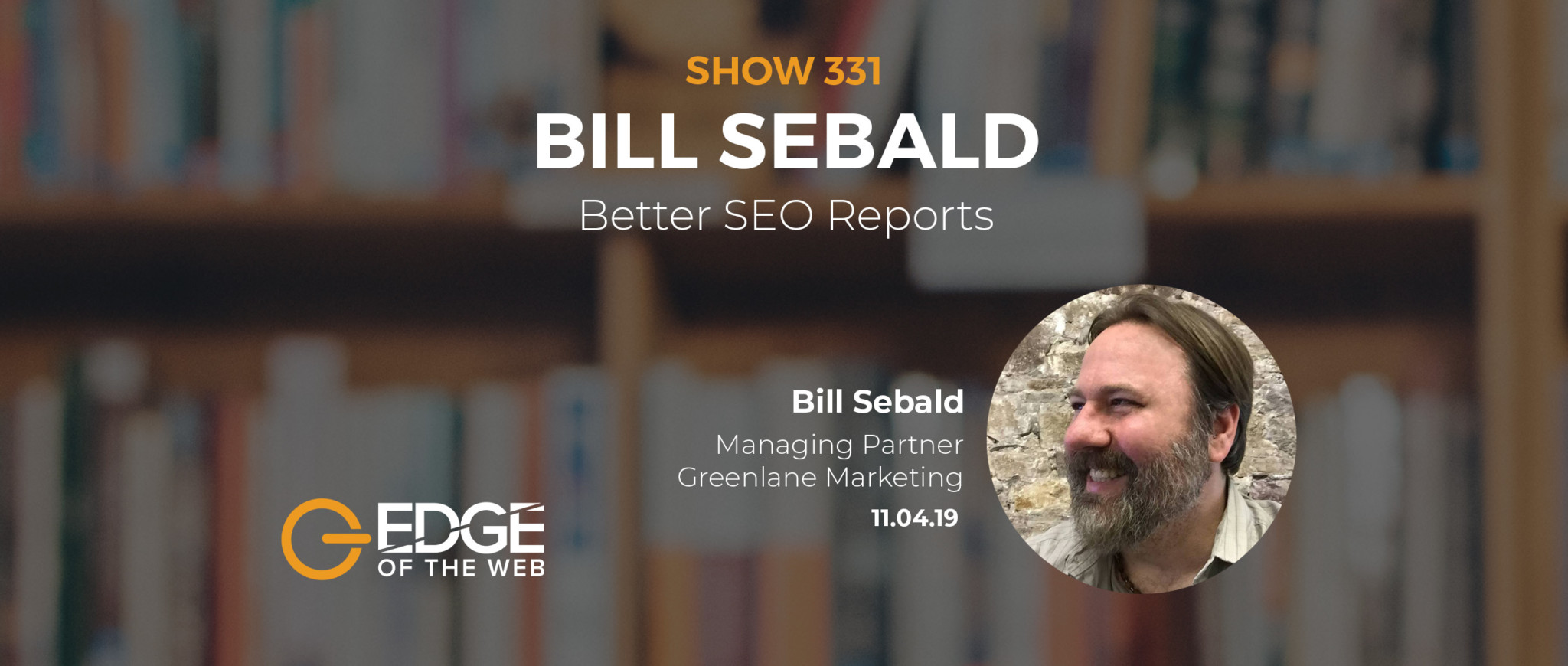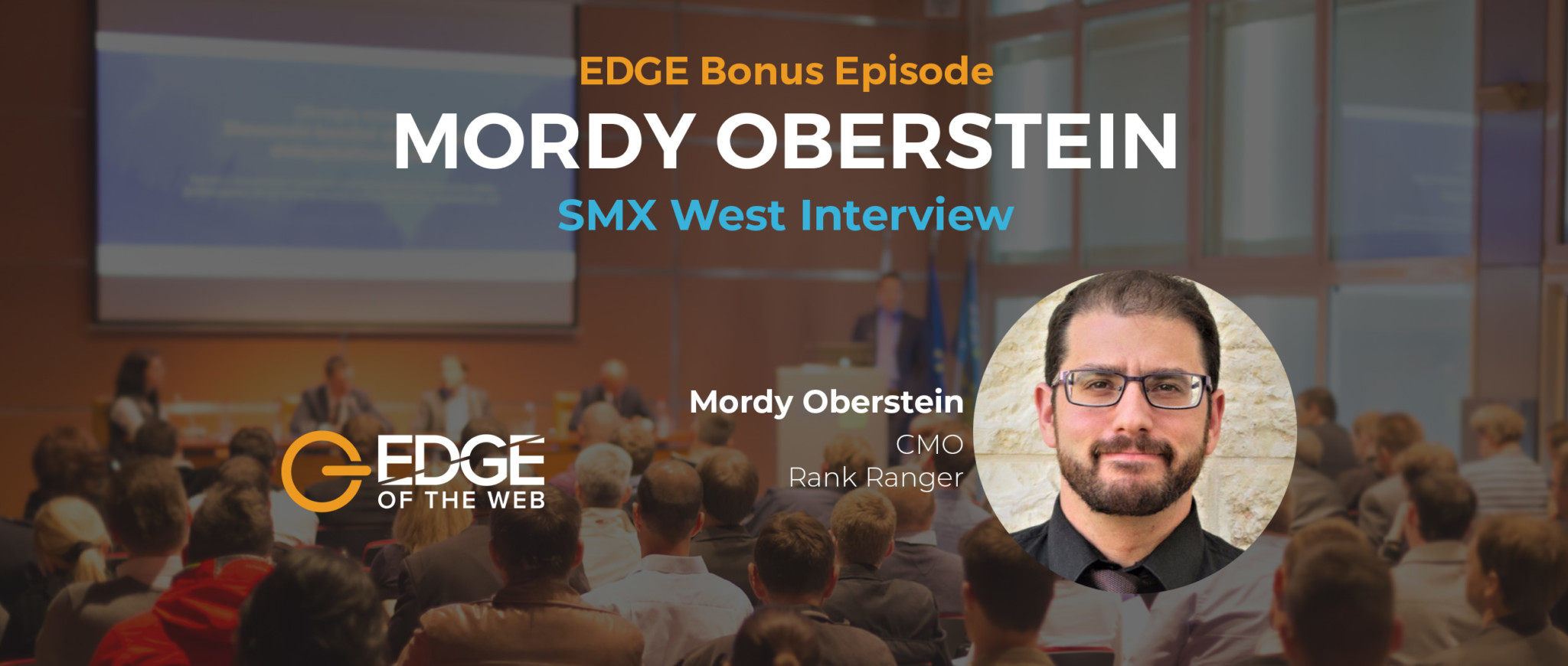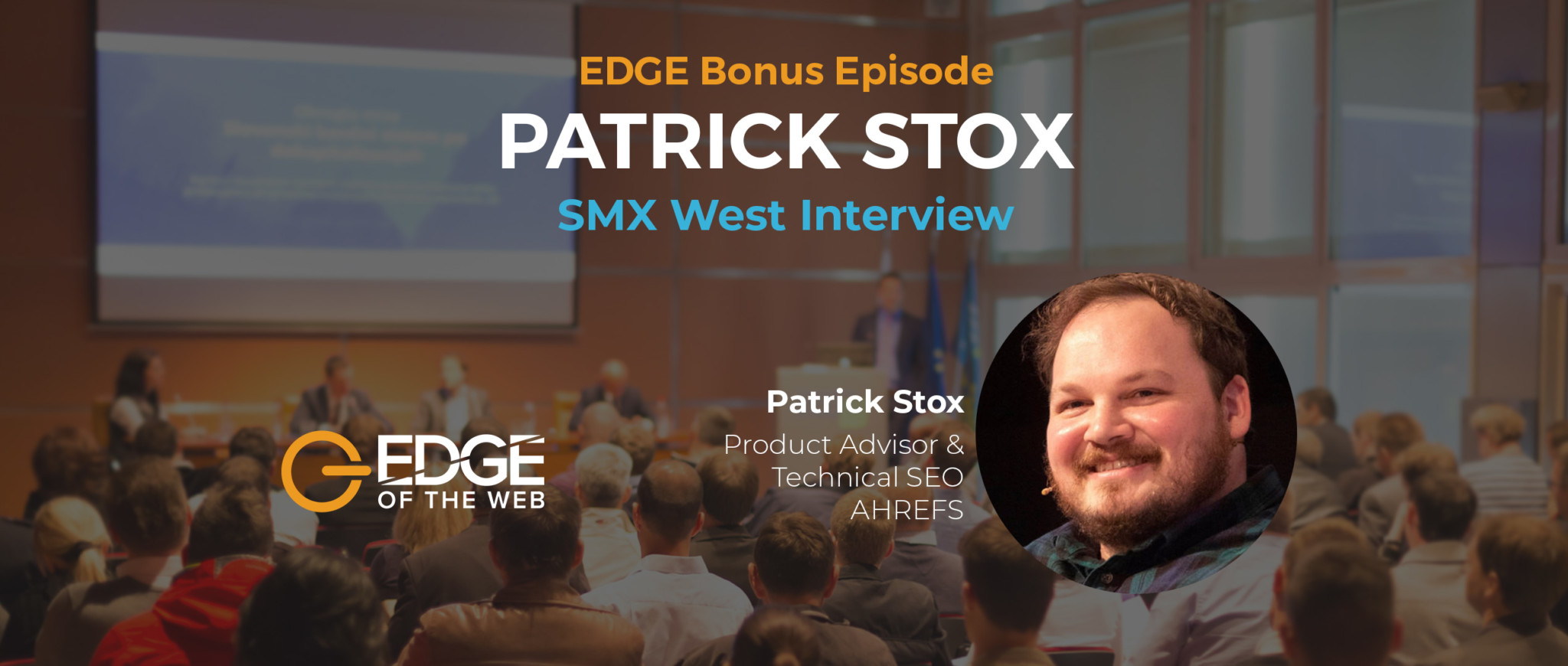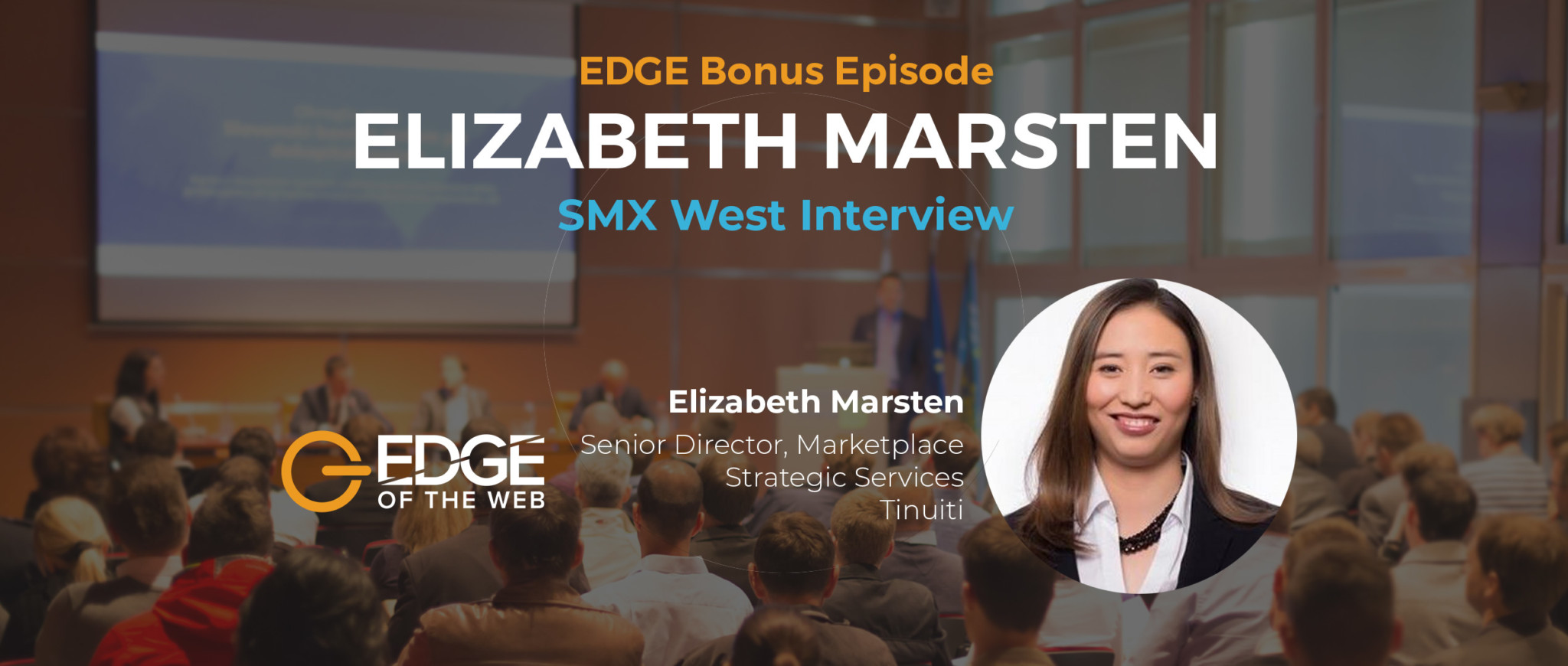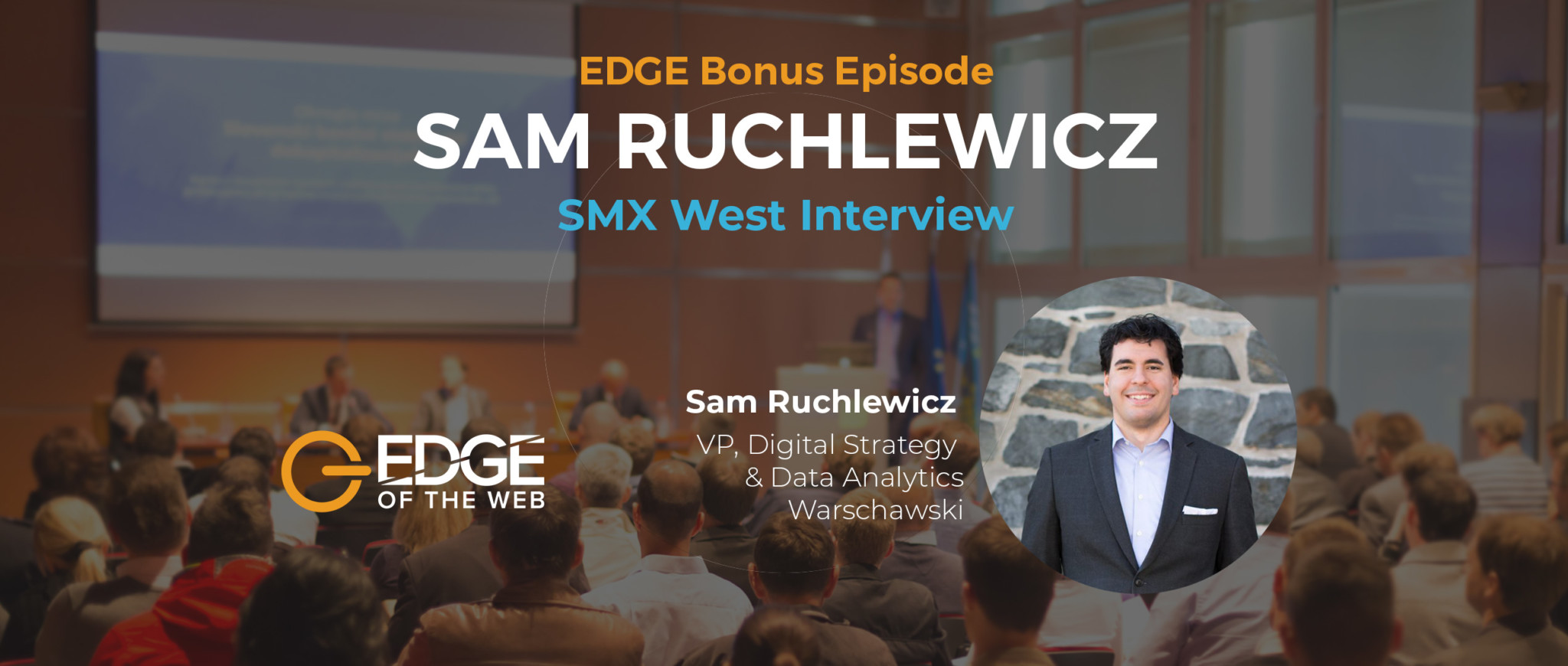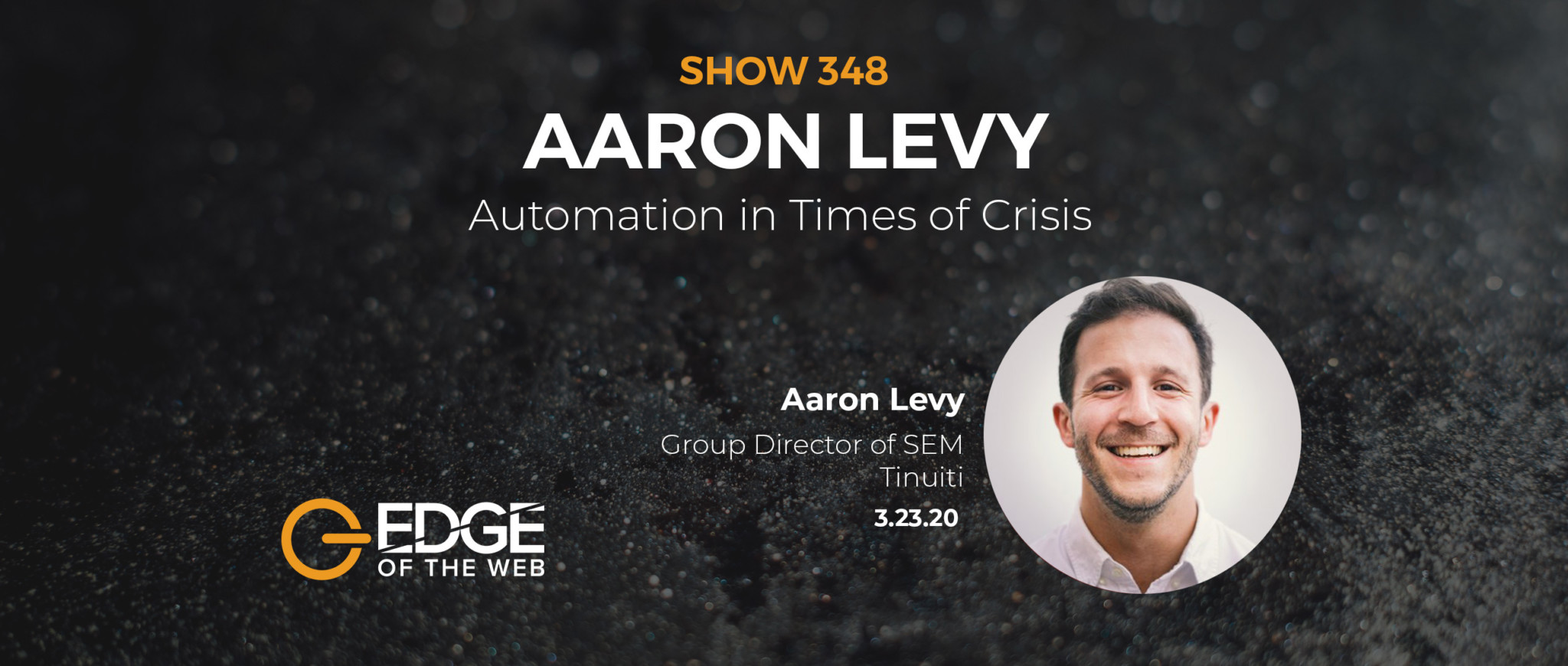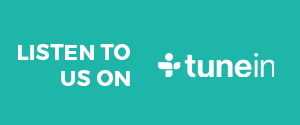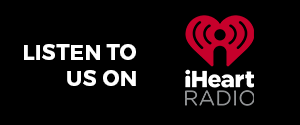Announcer: 00:01 On this episode of EDGE of the Web.

Bill Sebald: 00:04 To me I think the best SEO report is really start with the basics. Everybody wants the basics. We’re an industry that was born and raised on rankings, so go ahead and show the rankings, right? But the story isn’t always just within the rankings, so then let’s talk about traffic. What kind of traffic did we drive to a page? Well, sometimes you’re driving bloated traffic and that’s not so much to be proud of. So let’s talk a little bit more, let’s dig in a little bit more. Now we’re going to talk about conversions, or we’re going to talk about leads or whatever we’re really hired to ultimately do.
Announcer: 00:34 Your weekly digital marketing trends with industry trendsetting guests. You’re listening and watching EDGE of the Web. Winners of best podcast from the Content Marketing Institute for 2017. Hear and see more at edgeofthewebradio.com. Now, here is your host, Erin Sparks.
Erin Sparks: 00:55 If you’re a new EDGE follower jump into the newsletter, our own newsletter. If you want to text to the number 22828 the word EDGETalk, you can sign up right there. We are actually curating all content that comes from the show, focusing on the interview that we had, key insights of our guest as well as news items of the day, as well as who we’re going to be talking to next. So if you want to join that free of charge, we will not use your email for anything except sending digital nuggets of gold. Just a little bit of housekeeping here. We had a great interview with Andy Drinkwater over at IQ SEO, and we went over his SEO checklist, 209 point checklist, by the way. Well, we were so excited and we went real long, I went real long on the show, that we’re actually going to have another round with Andy, but we’re not actually just going through more checklist, we’re actually going to do a live SEO audit on the air. Yes, live.
Erin Sparks: 01:51 We’ll be live on November 13th, noon Eastern on YouTube, and we’ve also scheduled a link post at, actually we have that link now. If you want to go and submit your website to the URL, edgeofthewebradio.com/SEOauditlive. You can actually submit your URL, your website right there and it’ll go into the basket and we will not pick the actual site until the day before we actually go live. Now, we’re not going to prep on any other SEO, we’re going to do a live review of that site. So we’re going to pull out our respective tools, Andy and I. We’re just going to go to town on that site and be able to give some really good insight and hopefully good feedback. What else could go wrong, right? It will be perfectly executed. So if you are not timid and if you’re not afraid of having your baby called ugly, which we probably won’t say on the air, but you got to be able, have a little bit of intestinal fortitude to be able to have your site scrutinized like that, but we want to be able to give you some great feedback right there and then on the air.
Erin Sparks: 02:59 So submit to that site again. It’s edgeofthewebradio.com/SEOauditlive, and I think we also have a hashtag that we’re tossing around as well. So check out EDGE of the Web or @EdgeWebRadio’s Twitter and the hashtag is right there. So you can actually even submit it right at that hashtag.
Erin Sparks: 03:16 All right, want to thank Ahrefs for continuing to be a sponsor of EDGE. Ahrefs actually makes competitive analysis very, very easy. You can see what is happening on your competitors and you can see how they’re ranking on what pages, and hey, you can actually deconstruct their own SEO and make it work for you. So check out Ahrefs. They’re a fantastic tool and we are certainly using their data regularly, and hey, jump over to get a free trial at A-H refs.com. That’s A-H-R-E-F-S.com. Start a free trial today and you’ll be swimming in data. There’s a lot of data there too, so it’s actually really fun to understand the landscape a little bit better.
Erin Sparks: 03:56 All right, follow all the featured trending topics over at edgeofthewebradio.com, but now let’s deep dive with this week’s featured guest.
Announcer: 04:04 Now it’s time for EDGE of the Web featured interview with Bill Sebald, managing partner at Greenlane.
Erin Sparks: 04:16 All right. Let’s introduce Bill to our audience. He’s founded Greenlane, a Philadelphia SEO and digital advertising company. After 15 years of e-commerce and SEO experience, he was leading the first group of SEOs at GSI Commerce with clients like Toys “R” Us, Dick’s Sporting Goods, PetSmart, and Calvin Klein. There is a few names out there. When he’s not leading the team he’s also writing on sites like Search Engine Land and Moz, and I believe he’s a preferred agency from Moz, as well as their own blog, and he also is doing a number of speaking engagements regularly, and when he’s not doing that he’s digging into hair metal, which we reference, as well as bad monster movies.
Erin Sparks: 04:58 All right, Bill. We went through the roundup of hair bands, but bad monster movies. Let’s dig into a couple of those real quick. What are your favorite bad monster movies?
Bill Sebald: 05:09 All right, so we start with C.H.U.D., then we can go through all the Friday the 13th movies, and then maybe we dig into.
Erin Sparks: 05:16 Toxic Avenger.
Bill Sebald: 05:16 We could go and go.
Erin Sparks: 05:17 Toxic Avenger.
Bill Sebald: 05:17 Hotel Hell. Oh yeah, one, two, three, four, I think they’re up to five, all the Troma movies.
Erin Sparks: 05:21 All the Troma movies, yeah.
Bill Sebald: 05:23 What’s this podcast about again?
Erin Sparks: 05:25 I have no idea. It’s off the rail, it’s off the rail. Plan 9 from Outer Space. Come on.
Bill Sebald: 05:31 I’ve seen it.
Erin Sparks: 05:32 That’s got to be the best bad movie. What about The Mangler?
Bill Sebald: 05:36 That’s a good one. Wow, people don’t think about that one very often.
Erin Sparks: 05:39 Remember MST3K?
Bill Sebald: 05:42 Yeah.
Erin Sparks: 05:42 All right, so they did one show that was just incredible, Manos: The Hands of Fate. Did you ever come across that?
Bill Sebald: 05:48 No, that one.
Erin Sparks: 05:50 Oh my gosh, you got to watch the-
Bill Sebald: 05:51 That one has eluded me.
Erin Sparks: 05:52 Got to watch the MST3K version of that because they just tare it up and it’s the dumbest movie known to man. It’s a horror movie and it’s just ridiculous, but you’ve got to watch their take on it as well.
Erin Sparks: 06:04 All right. Sorry, I had to go down there. We just had Halloween, guys. So I mean.
Bill Sebald: 06:07 Of course.
Erin Sparks: 06:08 I’ve been going through horror movies like Pez, so I just wanted to hear Bill’s take. C.H.U.D., that’s an awesome one. All right. We just introduced your history. Why don’t you give us your backstory and how you came to be in SEO?
Bill Sebald: 06:22 All right. So I started doing SEO, my first website was 1996. I remember, I don’t even think I found the word SEO until a couple years later, but I was asked to bring some revenue into this company and search engines were out there, and Google, I guess Google wasn’t even really a thing yet. They weren’t who they were, and I just realized hey, if you hack these algorithms or you hack these search engines, that’s what we used to call it, right?
Erin Sparks: 06:46 Yeah, we did.
Bill Sebald: 06:47 You hack these search engines and you can actually get more people to your website. They might actually buy things. So that was where I got hooked on the whole thing, and I just kind of stayed with it for a while. I started a music magazine, I tried to do all sorts of different affiliate things on the side. It was around 1990 … No, it was around 2005 I think that I went back into the e-com world. So I was doing a bunch of consulting. Sorry about this light that’s cutting through here.
Erin Sparks: 07:12 No, it’s all right.
Bill Sebald: 07:13 Sun is moving. So I went back to consulting in about 2005, that’s when I joined up with GSI Commerce and that was really quite a culture shock, because now I’m in this big agency working with more than a 100 household name brands, and little bit of a trial by fire, try to figure out what I’m doing and be efficient and effective at it. So that’s where I really fell in love with the SEO game, and ever since I just think it’s the most fun channel. I’m thrilled to be able to make money doing the stuff that I love. I love the detective work, the whole thing. It’s just as hard as it always was in a way, and I really like those challenges. So always been, it feels like it’s always been part of me, Erin.
Erin Sparks: 07:53 That’s wonderful. That’s just, that’s poetic, absolutely. Well I mean, honestly that detective work it truly is, that’s the analogy there, is that you’re sifting through trying to find those causable factors, because on the surface a site may be looking completely fine, but you start digging into SEO, you don’t understand what you’re blocking, you understand the competitors, you understand the impediments that you may have on the site. That’s all the discipline, that’s all detective work right there. Along with that, detective work, that deep diving, right? Comes along with that, you have to have the ability to be able to report to your clients of those changes, right? And it’s a very intangible thing to be able to communicate. In fact, I just came from a meeting today and literally I geeked out and I turned around and I mean, there were eyes rolling back in their heads because they were not with me on this thing from a particular technical issue. You got to pull back and be able to understand you’re going to be conveying information about those changes to an audience that really doesn’t maybe understand these levels of technical focus that an SEO has to execute on.
Erin Sparks: 09:13 So reporting, not only efforts, but changes. How things are actually occurring based off those changes are really, really important because for C-levels it’s intangible. They don’t understand the space, and on top of it, SEO has a real bad stigma over the years, and you hate even saying that now in 2019. It’s been long-standing that the smoking mirror aspect of SEO has kind of followed along the entire time. What are your thoughts about just the education space for our clients now to be in understanding SEO? What’s our responsibility or their obligation in that space?
Bill Sebald: 09:54 I actually, I love what you said earlier about, you said, “Maybe it’s a little self-serving, but we do this podcast to educate ourselves.” When you’re doing any kind of reporting, it’s not just for educating the client or your boss, right? It’s really you’re doing all this work so that you can find the stories in the data, so that you can find the information and relay it in a language that your boss or client understands, and if you’re not really doing that, if you’re just kind of throwing numbers out, like here is a table full of numbers, and people look at it and go, “I don’t know what it means but I’m trusting you’re an expert and hopefully you know what it means.” But it’s all about asking why and it’s all about finding out why. That’s part of the detective work, right? Why is this happening? Well, the reports really need to give you the steps towards figuring out why something is happening. So the reports can’t just be these loose things that everybody hits, that somebody could hit export on and go, “I got this SEO report. We’re done.” It’s got to be a lot bigger than that. It’s got to be really a storyline. It’s got to be the why this is happening to lead to your next move, and boss or client, this is what we’re going to do next because of what we’ve discovered.
Erin Sparks: 11:02 No, absolutely, and in telling a story, you have to be telling a story to the client and you got to get them started and carry them continually through that because these reports are alien, and they’re also slices of time, right? Is that it’s whether it’s a three month against three month view, or god forbid a month against a month, because the choppy waters in organic searcher are ever increasing, and there’s got to be a place where you’re taking the analytics away and actually being able to tell the story of the moments in which you’re kind of creating that additional value from the efforts inside of SEO. So when it gets down to … I wanted to actually take a pause here and just talk about the clients here for a second, or if you’re inside of an agency there are certain types of dispositions or demeanors of who you’re going to be reporting to, and we have to actually not only be able to break it down into assessments and tell that story, technically that actually is resulting in measurable differences, but you also have to understand who is the recipient because, I mean, I quickly broke down a couple, about four different types of clients that we come across every once in a while.
Erin Sparks: 12:26 You have clients that are in the know. They’ve been in SEO, not so much in the industry but they worked on different things in the past with agencies or internally, and they know how valuable, how critical SEO is, and that’s wonderful. You want to have that type of client regularly because they get it and they’ll listen to what you’re talking about, but other clients, and I’ll ask you to comment on this, maybe a little knowledge can be dangerous. What do you think about those type of clients?
Bill Sebald: 12:58 I think you … You lost me on that actually.
Erin Sparks: 13:02 Oh, sorry. No worries.
Bill Sebald: 13:04 I started to think, I was like, “Wow, yeah. This is, I really like the idea of breaking them down.” At the end of the day … And this light in my eye, that son of a gun.
Erin Sparks: 13:13 That’s my laser pointer, by the way.
Bill Sebald: 13:14 Yeah, I’m getting LASIK for free.
Erin Sparks: 13:18 It’s all right. Don’t worry about it. So here is the four type of clients I looked at.
Bill Sebald: 13:22 Yeah, I want to hear.
Erin Sparks: 13:23 So the ones that are in the know, maybe a little knowledge can actually be dangerous. They think they can do it themselves but they don’t have time. Then you’ve got the other client that’s a distracted client. They’re constantly chasing squirrels, so whenever you’re reporting your efforts, your execution, and then they say, “Hey, what about this? Aren’t we doing this?” Right?
Bill Sebald: 13:45 Yeah.
Erin Sparks: 13:45 There’s I’m sure a number of different types of clients out there, but pick one and give me an idea of how you respond to them.
Bill Sebald: 13:54 Well, I’m glad you listed them. So I think that’s a really good breakdown of them. So to me what I think you need to do is expect that when you give a report to somebody it’s going to be passed around. It can be passed around to the CMO, it could be passed around to a products manager. You don’t know their level of understanding.
Erin Sparks: 14:09 Yeah.
Bill Sebald: 14:10 And some people, and we included, I’m right-brained. I see a ton of numbers and I don’t know what it is, so I like visualization. I like taking the data and forming things that are really pretty simple. Don’t make it complex. The insights that you should provide with a good SEO report should actually be written in natural language, here is what this means in case you look at these numbers and your eyes glass over, like a lot of people do. A lot of people who are seeing these reports, especially when you’re working with a client, they have a lot of jobs, they have a lot of different hats. They don’t want to sit and study. We shouldn’t assume that they know how to read these fancy charts and can look at these numbers and understand what they mean. So the more that we can break it down, the better, and that’s the importance, the most important part is really from an agency or a consultant, right? Our jobs, we’re consultants. Our job is to explain and show people things they haven’t seen or understand. They don’t even know the things that they’re supposed to ask sometimes, so it’s our job to bring that information.
Bill Sebald: 15:05 Again, the reports are a perfect vehicle to bring that information. So it just has to be put together in a way that, I don’t want to say Fisher-Price because I don’t want to cut out some of the complex things that sometimes you have to translate and educate the client on, but you just need to be aware of the design of your report so that you’re surely making, you’re passing a deliverable along that is impactful.
Erin Sparks: 15:29 No, yeah. I’ll just reiterate what you’re saying there, is that you have to be able to recognize that that report is going to go beyond who you’re actually talking to. That it’s going to be sent and carried down the hall to somebody else that you may not even know, and they have to understand it as well, but we’re paid to interpret, not just report data. We have to be able to interpret it and make sense out of it, and that’s great, being able to actually have bubbles of text to be able to show these particular key points, what this means, what this means. Literally you’re that Sherpa that’s guiding them through that information, and if you just copy and paste, I’m going to tell everybody again, if you just copy and paste Google Analytics charts that’s the most frustrating thing the world because here is the deal, your client, you’re right, is doing a heck of a lot, and then you’re telling them that you expect them to understand what you’re pointing out without pointing it out. It’s almost insulting actually because they’ve got a busy job. Tell me what I really need to know, right?
Bill Sebald: 16:33 Yeah.
Erin Sparks: 16:33 Oh my gosh. All right, so we’re talking about making better SEO reports. You just had a recent blog regarding that, and there’s a couple key things. Kind of the hypothesis of building a report that I’d like you to expand upon. One point in particular, what does the data tell me about our visitors? That’s a general point, but this is the beginning of an SEO report, correct?
Bill Sebald: 17:02 It can be. I mean, you really want to know what the KPIs are that your client or your boss is looking for. To me, I think the best SEO report is really start with the basics. Everybody wants the basics. We’re an industry that was born and raised on rankings, so go ahead and show the rankings, right? But the story isn’t always just within the rankings, so then let’s talk about traffic. What kind of traffic did we drive to a page? Well, sometimes you’re driving bloated traffic and that’s not so much to be proud of. So let’s talk a little bit more, let’s dig in a little bit more. Now we’re going to talk about conversions, or we’re going to talk about leads or whatever we’re really hired to ultimately do, but you shouldn’t even stop there. I think you ought to keep going and try to figure out what the bigger marketing initiatives are that your client has. Maybe email acquisition is super important for reason X, Y, and Z. Well, make sure that that goes into your report. Seems kind of weird that your work feeding into something that lives in the email channel would be considered something that goes in your report, but I say, why not include it? I mean, SEO is so part of all the digital marketing channels that it makes total sense to report on that, in my opinion.
Erin Sparks: 18:04 A lot of times that SEO consultant could probably make a better interpretation because they’re living and breathing in the analytics. Then, maybe some of the other players that are executing the email campaigns, sometimes those email campaigns aren’t being driven by people that are analytically minded. So you could probably catch a little bit of insight and be able to provide that to the client. Now, that’s some obligatory information, traffic rankings and conversion data, right?
Bill Sebald: 18:33 Yeah. Yeah, I think your default should at least have that. To your point, I mean, I think it’s so … We have a typical problem, especially in the agency world, where departments don’t talk to each other. I don’t know why that is. It’s always been that way. Groups are a little bit siloed, so the information that we’re getting in search about the searcher, right? A searcher goes to Google, they enter in a query. That query is a need. That’s already be default telling you something about your target audience. You can classify the kind of keywords that you’re going after. That could help you figure out some more things, but merge that data in with maybe data from Facebook about people, even start to take demographics and psychographic information. Start really getting to understand who your searcher is. Your searcher is probably the same person who is signing up for your newsletters and who you should be targeting with email. So the SEO data just, it has to be created in a way that’s really valuable for your whole organization, because it’s really important information, it’s really crucial data for a company.
Erin Sparks: 19:35 I dig the behavior and intent concepts there because that’s what we’re all doing. We’re all marketing towards that. Let me back up for a second, and just talk about keyword rankings. I tell you what, that’s been a double-edged sword bar none from an SEO report. I mean, should rankings actually be part of an SEO report? If a keyword, and to your point in your blog article, if a keyword is down one day that you’re actually compiling a report and then it’s up by the time you’re actually presenting the report, you’re doing yourself damage across the board. These rankings aren’t permanent and they’re fluctuating so much. How can we rely on keyword rankings as a factor of improvements if there are so many incidentals that are changing those rankings on a regular basis?
Bill Sebald: 20:31 I think they’re one of many things that you look at, right? You understand, you have to understand that they’re directional, for the reasons that you said and reasons of personalization, being logged into Google, you’re going to get different results than the guy sitting next to you who’s logged in with his own account. I think rankings still have a place, I just don’t … I hate when somebody thinks, “Hey, give me this report on 10,000 keywords. I want to see where they’re all ranking.” How is that going to help you? How are you going to go through 10,000 keywords and do anything with it? I would much rather focus on a page, focus on a product that we’re trying to sell, identify where are the pages that are the most connected to those products, then focus on the keywords. Those keywords ought to be what’s feeding the page to get it to rank better, to show Google the authority that you need to show Google. So I think it has a place. I just don’t think that place is the place it was in 2005, right? In 2019 I think it’s just, it’s a small additive to the bigger picture of data that you have to produce to show SEO results.
Erin Sparks: 21:32 To continue the assumption that the client is going to get, or your C-level is going to understand that this is a particular core sampling at a given time, and there’s regional changes, there’s login changes that mix up that entire ranking. It can’t be the focus, and I’ve made mistakes in the past of literally giving so much data to my clients, even weekly. Hey, this has changed, this has changed, this has changed, and then they get fixated on the wrong thing. You’re absolutely right. The page level reporting is fantastic, and now we have tools, and the evolution of the SEO tools that gives us that insight. SEMrush is fantastic with the page level insights to exactly what, well, not exactly, but its assumption of the terms that are actually associated to that. That’s actually very, very telling about how effective your on-page optimization is actually working, right? As that is accruing over time. What about these visibility indexes? What about, I mean, all these tools have different types of grabs at out of how many keywords we’re tracking, your visibility is increasing. Is that still challenging for the client to understand?
Bill Sebald: 22:45 I think it’s the same thing. That’s just whether you put a formula into it or not. It’s still a summary, it’s still an aggregate of the rankings.
Erin Sparks: 22:52 Mm-hmm (affirmative), yeah. Go ahead.
Bill Sebald: 22:54 I would love to comment on your last statement too. The page level, page level is a little bit too granular. If you need to look at something a little bit bigger because your site is just massive, content groupings in analytics is such a cool thing. You can then group up all of your pages that maybe represent your entire campaign for selling sun dresses, and you can look at everything in a little bit more of a aggregate level so it’s not just specific page level, and focus on that. There are so many tricks that you can do to make reporting make a little bit more sense. I mean, Data Studio. I don’t know how many people are using Data Studio. It’s been out for a few years. Data Studio if you don’t know [inaudible 00:23:32].
Erin Sparks: 23:31 Okay.
Bill Sebald: 23:32 It’s a mix of like taking Excel and their great graphs and their data organization and mixing in let’s say Google Analytics information, right? So it’s this middle ground. So Data Studio when you log in, it might take an hour or two to really wrap your head around what it’s doing, but what a great tool to create these dynamic at your fingertips reports to customize exactly the data that you need to see to choose your campaigns and to optimize campaigns. It’s like taking, let’s say you have … People are talking about all sorts of these tools, Looker, Tableau, Power BI. To me Google Data Studio is a perfectly usable one for any SEO. It’s not hard to learn, it may not be quite as complex as some of those others, but we don’t need totally complex. We need to be able to take a couple different sources of data, blend them together, get the big picture that we need with really, with relative ease, to be honest.
Erin Sparks: 24:32 You better believe it, and there’s an additional benefit with Data Studio is that you can actually give that to your clients as a shareable link, and it’s live data.
Bill Sebald: 24:41 Yeah.
Erin Sparks: 24:42 You can actually customize a report that actually is really what they’re looking for, and break it down into, and you can also merge Search Console data along with Google Analytics data and a lot of different APIs at the same point, and you can really clow that picture much more than the individual siloed platforms that we’re used to digging in. So it’s really a good amalgam that’s a storytelling point for what you’re trying to achieve to the client. So now that’s a good point. We know and they are in the realm of these tools. I have keyword clusters. This is what’s really cool as well, is that no longer are we having keyword ranks as the potential key performance indicator, but starting to group these terms together, now we can actually start seeing more intent oriented reporting now than ever before. Now, if you have your pages well thought out and your site structure well thought out, reporting growth of areas of like buyer’s journey in a website, right, with organic traffic, that absolutely gives you SEO cred, does it not?
Bill Sebald: 25:51 Oh, for sure. I mean, the way that Google is ranking pages now, they’re ranking pages based on intent more than they ever did, and that was the big update that came with Hummingbird five years ago. I suspect with BERT, I got to get used to calling it BERT.
Erin Sparks: 26:04 I know.
Bill Sebald: 26:04 It’s just, it’s more of the same. They come up with these names. I know it’s an acronym but. You ever notice whenever they put out anything like this they give you this, Google gives you this explanation of what these big things are in a language that nobody can understand?
Erin Sparks: 26:18 Oh yeah.
Bill Sebald: 26:18 It’s the craziest. So now we’re as an SEO industry trying to scramble and interpret this language that.
Erin Sparks: 26:24 That’s patent oriented. That’s where it’s coming from. They’re patent submissions, and all of a sudden it bubbles up to the top and we have to figure out the acronysm for that. I don’t think it’s ever going to roll off, it’s a bilateral encoder. Oh, crap.
Bill Sebald: 26:40 Transformers is in there somewhere.
Erin Sparks: 26:42 Yeah, I can’t remember [crosstalk 00:26:43]. I just did a bloody story on it this week. But, I will just stick with BERT, and again, it comes along with the Sesame Street icons, so we’re going to have a blast doing that. But you’re right, it’s all intent, and they’re digging in more and more. So keywords and holding the SEO accountable to any particular keyword performance, just for those decision makers out there and the clients, you got to back away from just keywords. You got to have a better education of what SEO really means, because on any given day you can be up or down within a particular range of deviation, and if you look up your rank from your computer, and then call your SEO and say, “Hey, I thought we were first but we’re eighth.” There is so much wrong with that picture. We can’t even unpack it, except that you’re already logged in, it knows your behavior, and if you’re not clicking, if you’re searching the same term and you’re not clicking on your own site, then Google is thinking that you don’t want to see that site. So it’s moving it down, people. Sorry, that is a public service announcement right there. All right.
Bill Sebald: 27:57 Yeah, I would add too, if you’re … I got to be careful or I’m going to get in trouble if I say this wrong, but if your agency is focused squarely on keyword rankings as your primary KPI, as a client you shouldn’t have to push your agency. Just be like, “Show me more.” Because it’s 2019, but I’m going to show you more. There is way more to it than just rankings, trust me.
Erin Sparks: 28:20 Absolutely, and that gets to the point, is that reports from SEO agencies can be also cover fire, and that’s part of I guess the frustration of the clients and internal management they have is that they’re trying to figure out what they’re interpreting, but why aren’t I seeing something else? How it actually affects my bottom line? Trying to equate ROI to SEO has been a much debated concept, but just you can certainly pepper the entire canvas with so many data points that you confuse the reader and they’ll just give up, and that’s certainly the wrong attitude, and you got to be stiffing that out from your own agencies. If they’re doing it, if they’re shoving a rank report in front of your face without the additional insight into what’s happening, what they’re doing, what they’re changing, right? In that 30,000 foot level, then I mean, honestly, they’re not doing their job because they’re just churning out a report that’s coming out of one of their tools. All right.
Bill Sebald: 29:22 I think that makes perfect sense, and I’m sorry, and I see you’re trying to move on to the next section of the segment, but it’s, we’ve said this to our team as well. You got to put yourself on the hook. You got to create reports that can show the client that maybe you’re failing, but maybe you’re not failing, maybe it’s Google is making changes, but don’t be afraid to show failures and don’t be afraid, just like you’re not afraid to show wins. Show those wins, pat yourself on the back, show the client what you’ve been doing, justify your job, great, but you have to show the stuff that’s not working and then go back, and we’re circling back to a couple minutes ago, and show the why. Why isn’t it working? And ideally if you’re doing a bad job you’re going to get caught with your pants down, but if you’re doing a great job, then you’re going to win the trust of the client, you’re going to be able to repair what’s wrong a lot easier, and you’re going to be able to show your work the whole time. So that’s the value of a really good SEO report.
Erin Sparks: 30:12 Absolutely. Researching this particular show, I came a couple key frustrations, not only just going back through my own history, but consistency in tools is something that is a continued frustration point for a lot of clients, is that all of a sudden I saw one report over here, now I see another report over here. You got to have that while we’re still friends conversation, when you begin the engagement and be able to say, “This is what we’re going to look at. This is how we’re going to look at this as a model.” Yeah, there’s tools galore, and any tool can be spun to make it look good or bad. Point being is just let’s stay in this pocket. This is how we’re going to actually report this. You got to get buy-in from the client thought. They got to be able to be a believer in what you’re reporting and the accuracy, yeah, but you are going to report the negatives and the positives, and we all have to hold onto the ride but also hold onto one type of tool from a lens, at least to be able to report. We certainly have a lot of different tools that we can go siloing to a particular analysis, but if you’re spinning out so many different reports from those tools, the client doesn’t know what to look at, right?
Bill Sebald: 31:24 For sure, yeah. Consistency is key. Pick the tools that you like, stick with them. I know in my past I’ve used a bunch of different, going back to ranking, rank trackers, and the tools were always saying different things, to the point that you made, because any IP is going to pick up a different ranking than another one. So find one, stick with it. We’re Ahrefs users, we like the language that they use for their backlinks. So we don’t try to mix that up with Moz’s DA and PA, it’s a little bit more common. Just the one that you have, stick with it, be very clear about what you’re using and make sure that your client understands why you’re using it, why you favor it, and what the metrics actually mean.
Erin Sparks: 32:04 Very good, very good. ROI reporting on SEO, because it always gets down to that. What’s my return on the investments that we’re making? Trying to connect the dots for a client and be able to show the long game, not the short win game. That’s not what SEO is about. So how have you accomplished that connection to be able to not only show the leads, but also the equity or the value that they’ve actually been benefiting from?
Bill Sebald: 32:41 That’s always been my biggest challenge. Yeah, I know the ROI formulas, but when you really understand the way that Google works and how much of what you’re doing is influencing a user in ways that you can’t track, right? Let’s just use what’s happening now, right? The idea that 50% less of things being … I think that it was the metric, maybe I’m off, but let me rephrase it. So a whole bunch of people are going to the SERPs, they’re not actually clicking, but they’re seeing your information, they’re hearing it in their Google Home. So a lot of this stuff isn’t that trackable. You could think about ZMOT, zero moment of truth, the idea that Google put out that people were searching for up to 10 different places to make a purchase decision. Well, a lot of them aren’t trackable.
Bill Sebald: 33:25 So your SEO is influencing that, but you can’t actually grab and know exactly what that number is. So I was thrilled when digital marketing kind of came up, and now we had these great data points that we never had before. It was great, but then I felt like we started to hang onto them too much. It’s like these numbers that we have, every decision has to be based on these numbers, and the creativity of what we’re doing as marketers sometimes can’t be justified because we’re hanging on the justice data that we can report, and not the bigger picture data, the whole halo effect data.
Erin Sparks: 33:57 No, you’re absolutely right. In fact, I had just that example today. We have a municipality, a school district that we work for, and we’re trying to convince them to claim their Google My Business accounts, and we want to have them verified, we want demonstrating what data can be seen by that, their GMBs, and literally we have maybe 10,000 visits a month to a particular high school, but the Google My Business photos were being seen in one month a 167,000 times.
Bill Sebald: 34:28 Yeah.
Erin Sparks: 34:29 That real estate is incredible, and that’s not SEO, but at the same time your rankings, your visibility is affected, but being able to paint a larger picture of where SEO is also a part of, but giving the larger scheme of data. We all aim for myopic on just the rankings, right? We’re going to not see the bigger picture.
Bill Sebald: 34:52 That’s right. Right, that SEO halo effect is huge and you can’t discount it.
Erin Sparks: 34:57 Yep, yep, yep, yep. All right. So I’m going to go a little bit dark here at the end and talk about a couple things that SEO, reporting SEOs need to fence with. One of them being that working with the entrenched tech that actually may be sending that C-level on a goose chase. So to set the stage is that if you’re an outside agency that’s hired to be able to provide SEO, and you have someone that’s also in that organization maybe working against you, and poking at the soft spots of what’s happening from an SEO standpoint. How do you actually reconcile with that? Because a reporting may be more than likely not just reporting keyword rankings, but you’re reporting momentum and organic growth, but they keep on jabbing you via the C-level. How do you take that on?
Bill Sebald: 35:54 Here is the answer. You figure out exactly who they are and you send them a case of beer every week. You play that game. Yeah, we see that a lot unfortunately.
Erin Sparks: 36:05 Yep.
Bill Sebald: 36:06 I think it’s really important, when we do our work we try to make sure that we’re not just only talking to the middle person, right? The person who then takes this tech recommendation and throws it over to the developers. We say, “Can you put your developers on the phone? Let’s have that conversation with them.” Because it’s really important to sort of create rapport with them too. Sometimes they feel challenged from an outside SEO agency. We don’t go in and say, “All right, you guys have your pillars and your structure, we’re going to knock them all down and ruin your day.” We’re going in as consultants and saying, “Okay, we understand what your pillars are, we understand what your busy case is. We’re going to try to figure out how to work within what’s already there.” If there’s things that we just believe can be chipped away and changed, we’ll get to that point. We’ll be able to build rapport and build trust with all the key players. It is a little political, it is a little bit of performance that we have to do as consultants, but that’s the way that we get by it.
Bill Sebald: 36:57 We try to understand what the opposition is and then how we can address the opposition, and then we just have conversations with them. Nine times out of 10 that does solve the problem.
Erin Sparks: 37:09 Yeah, yeah, yeah. Because they feel directly threatened and on top of that, if they’re not knowledgeable about your specific space they’re going to feel even more threatened. So if they can actually whip up something and look at something that will derive confidence. I mean, I’m painting a bad picture, but I mean, it happens more than you know inside larger organizations that hey, I could do that, why are you hiring another agency to be able to do that mentality. You got to be able to get them on your side. You’re absolutely right. So the ones that you can’t get on your side are the competitors that are in the ear, that are trying to sell your client, your business basically. Trying to scoop you out of the equation. How can you fend off everything? Because any given time you can paint a negative SEO picture. Hey you’re not ranking here. Why aren’t you ranking here? Isn’t your current SEO company taking care of this particular space? How do you actually arm, not only defend yourself, but more importantly how do you arm your client with enough knowledge to be able to push those attacks aside? What do you think?
Bill Sebald: 38:20 Yeah, I mean, we’re a relationship based industry. So we’ve certainly had that happen, where somebody says, “I just got this collateral from a sales person.” I’m like, “Yeah, I looks like a straight export right out of Screaming Frog. What are you shelling me?” And they say, “Well, they’re saying this, this, and this.” And that’s great, we have that opportunity to say, “Well, there’s a reason why we haven’t gone after this, this, and this.” They’re saying, “Focus on H1 tags.” And we just heard Google say they don’t matter as much as they used to. You can show your authority and your importance, your expertise in the space and hopefully you can build a stronger connection based on that kind of ongoing forever important … I’m losing my mind. You see what.
Erin Sparks: 39:02 Absolutely.
Bill Sebald: 39:02 I mean, you build that relationship and that’s one way that you can forward it, but there’s just times where, and it’s happened to us, where suddenly a client we thought everything was going well with has decided to leave. They’ve been romanced by another agency and we say, “Whoa. We would’ve loved for you to have told us you weren’t happy and then we could’ve figured out what we could do differently, and if we couldn’t do it better we’d want to part ways with you because you don’t like what we’re doing.” But you don’t always get that opportunity. You just, the best chance you got is really to just make somebody think that they got the right company, and the only way that you can get somebody to think that they got the right company is to be the right company and to really work hard to keep that relationship strong. I hear so many times a prospect will come in and say, “I feel like our SEO company had us on autopilot.” Yeah, that’s common.
Erin Sparks: 39:50 Especially whenever those companies are web development companies, and they’ve taken a stab at SEO and they have nobody at the helm. They’re just kicking out reports. No, you’re absolutely right.
Bill Sebald: 40:00 Right. Yeah. No, that’s it. I mean, you just got to, you got to be better than your competition, and it’ll pay off.
Erin Sparks: 40:07 It will pay off, but I do have to put some of the responsibility at the client’s feet. They can’t allow themselves to be spun. I mean, businesses have a savviness now. They’ve been through this digital marketing space for the last 10 years, give or take. I mean, the fact of the matter is SEOs is a known marketing execution now. It’s not ethereal, it’s not putting magic fairy dust on a website. There is a practical discipline that any business that’s been in business for 10 years knows has to be applied to their site. They have to have responsibility on not being spun with and romanced by a company that’s trying to get their business, because there’s motivation there, absolutely, and they’re going to want to be able to call your existing agency with a bit of shade, right? That business owner, that decision maker has to have some knowledge in the SEO space, limited as it is, to understand the key factors of inbound, of on-site, of technical, and understanding that there’s a much larger aspect to digital marketing than just keyword ranks. So I’m going to finish my tirade there.
Bill Sebald: 41:21 I think you’re exactly right. It’s like the thing I sometimes see is people are very price sensitive, and SEO is one of these things now, it’s become a lot harder. You got to put in a lot more time. So it’s like you could go to a doctor and the doctor is $500 an hour, but this is a really well-known doctor for curing the specific ailing you have, some people are going to go and take that $50 an hour doctor. You don’t want the 50 an hour doctor. You want the one that does the job the best, but I understand that some people are just absolutely motivated by budget, and sometimes they have to be, but sometimes you got to put it on the client. Sometimes they’re just a little stingy and they don’t want to learn the real world that’s out there. For those people, I’m just not sure that SEO is the right game for them because SEO-
Erin Sparks: 42:09 Amen.
Bill Sebald: 42:10 Yeah, SEO is definitely a much harder game, and we do have charlatans out there who can tell you that for 300 bucks a month they’re going to get you number one rankings. I don’t know what industry you’re going to get number one rankings in. Maybe there’s a really obscure industry that there’s no competition in, but maybe there’s still one that exists. I hope I find it and make an affiliate site on it, but this thing is-
Erin Sparks: 42:30 Now here is a quick tip. If that actual pitch is coming from a @gmail.com account, I guarantee you don’t want to deal with them.
Bill Sebald: 42:39 Yeah. Yeah, if they have more sales people than they have SEOs that might be a sign too.
Erin Sparks: 42:46 All right. Bill, it’s been a pleasure talking to you today, and I appreciate you allowing me to go into a little bit of a tirade because obviously I’m a little bit passionate about this.
Bill Sebald: 42:55 No, it’s all good.
Erin Sparks: 42:56 I appreciate it. What would be your final thoughts regarding that SEO that is trying to get his message across in an SEO report, and needing that C-level or that decision maker to understand and listen? Give me a final thought on that.
Bill Sebald: 43:13 It’s really listen to your client. Listen to what they’re looking for. Really take the time to understand what their KPIs are. Once you totally understand what it is, then you can start layering on the things that they didn’t know they needed to know and why they needed to know. You can use this SEO report at that point as probably the most valuable asset that you’re going to be producing every single month, versus the kind of thing we were just doing before, where we were spinning them out of tools, and the SEO weren’t even getting value out of their own things that they were sending off. The great thing to just add on, we used to spend a lot of time pulling the data. Now it takes second with the Data Studio and all the APIs that we have. So spend that time that you would normally use creating these reports, spend that analyzing the data and creating insights for those SEO reports.
Erin Sparks: 43:59 Absolutely, absolutely. Bill again, thank you so much. We wrap up our show regularly, I ask a couple last questions. What bugs you about your industry right now?
Bill Sebald: 44:11 Besides the $300.
Erin Sparks: 44:12 Yeah, yeah, yeah.
Bill Sebald: 44:14 SEO campaigns that are guaranteed to skyrocket you to stardom? I think the thing that really bugs me is probably actually that. I think SEO has become a very expensive channel sadly because it takes a lot more time, and time is money. I wish, I know many, many, many, many, most of us SEOs do a really good job of taking the prospect that comes in our front door and sitting down and explaining, hey, this is what’s really out there. I wish maybe more did that, because I think that would help educate the clients, it’ll help educate businesses, and I think it’ll even help all SEO companies work a little bit better towards the goal of producing results for a client.
Erin Sparks: 45:02 Very good. All right, conversely, what excites you about your industry right now?
Bill Sebald: 45:07 Same thing that always did. I really enjoy the challenges, I love experimenting. I know we’re experimenting on our client’s dime, but that’s part of the game. What you think you know, you may not be right until you sit down and experiment, and learn, and it’s that detective work. It’s the detective work that I love that keeps me moving.
Erin Sparks: 45:26 Excellent. Very good. Well, again, thank you so much for your time today. We certainly want to promote anything for you. Certainly want to lift up Greenlane. They’re a boutique agency, and they’re a relationship-based agency. So we ought to give a quick commercial about Greenlane. Go ahead.
Bill Sebald: 45:42 Yeah, I think you just did it. Yep, we’ve been around since 2013. We sort of take an approach it sounds like you guys do, it’s very agile. We’re not looking to throw things over the fence, we’re looking to create relationships with people so that the stuff that we are producing we’re producing together. The idea is to really focus on some of those harder business goals that these companies have. We have a pretty veteran team. We’re boutique by design, so if you ever have one of those real crazy SEO challenges and you’re just like, “I wonder who the A team is.” Maybe you give us a call. We got it.
Erin Sparks: 46:21 All right. So you want to track Bill on Twitter @BillSebald S-E-B-A-L-D. Go track down Greenlane at Greenlane Team on Facebook and Greenlane_team over at Instagram. Certainly appreciate your time, man, and thanks for going through some of the ’80s stuff in the bad monster movies.
Bill Sebald: 46:42 My pleasure.
Erin Sparks: 46:42 Pardon my passion, man.
Bill Sebald: 46:43 Well, thank you for doing shows like this. This is really great for the SEO community.
Erin Sparks: 46:47 No worries.
Erin Sparks: 46:47 Thank you so much.
Bill Sebald: 46:48 Thank you for having me.
Erin Sparks: 46:49 Absolutely. All right. Thanks, that’s a wrap for today. Thanks for listening to EDGE of the Web Radio. Special thank you to all the colleagues here and Site Strategics for the production that we put on each and every week, and thanks especially to our guest, Bill Sebald, and make sure you check out all the must-see videos over at edgeofthewebradio.com. That’s edgeofthewebradio.com. We’ll be talking to you next week. Be sure to jump in to edgeofthewebradio.com/SEOauditlive to be able to submit your website so we can actually look at it on air and dissect it. Yeah, that’ll be kind of graphic, actually, but with us and Andy Drinkwater, we’ll treat you kindly. So check that out on November 13th noon. We’ll talk to you next week. Do not be a piece of cyber driftwood. Bye, bye.







